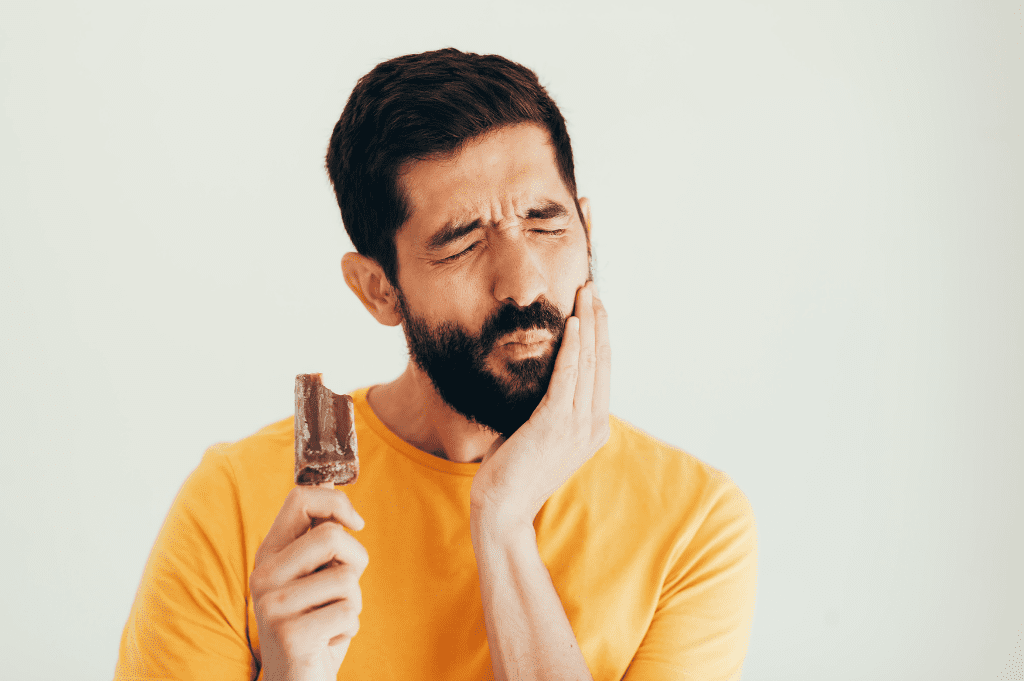Are you someone who suffers from sensitive teeth? When you drink a hot beverage or take a bite of ice cream do you quiver in pain? Chances are almost everyone has suffered from having sensitive teeth at one point in their life. But why does this occur? In this blog, I will go over what causes sensitive teeth and what you can do to fix them.
What causes sensitive teeth?
Nobody wants to have to limit their intake of certain foods or drinks just because of the pain it causes their teeth. So what are the main causes of sensitive teeth?
- Brushing your teeth too hard
- Tooth sensitivity can occur when you brush either too hard or use too hard of a bristle on your toothbrush. Over time, this can wear down the protective layers of your teeth. When tooth enamel erodes, microscopic hollow tubes or canals can become exposed which leads to your dental nerves. If these nerves are exposed to extreme temperatures and acidic/sugary foods, major discomfort can come as a result in the form of sensitive teeth.
- You like to eat acidic or sugary foods
- The more acidic and sugary foods/drinks you consume, the more wear and damage will occur on your teeth. This destroys the protective layer on your teeth, exposing the nerves that can cause sensitive teeth. Try to limit your consumption of these types of foods or wash your mouth out with water after eating/drinking them.
- You grind your teeth
- Grinding your teeth can wear down tooth enamel. By doing so, you expose the dentin or the middle layer of the tooth. Dentin is strong but not as solid as the enamel – and although less known than the enamel, it actually makes up the majority of the tooth structure. This layer contains the hollow tubes that lead to your nerves, thus exposing them more to outside elements that can cause sensitive teeth. Consider wearing a mouthguard at night if you grind your teeth.
- You use teeth-whitening toothpaste
- Teeth whitening toothpaste, although attractive to many, contains chemicals which can cause more sensitivity and harm to your teeth than good. Many manufacturers add whitening chemicals to their toothpaste formulas that can cause teeth and/or gums to feel irritated or sensitive. Use these with precaution. If you find your current whitening toothpaste causes these types of issues for you, consider switching to another one.
- You use mouthwash too often
- Over-the-counter mouthwashes and rinses contain alcohol and other chemicals that can make your teeth more sensitive. If your teeth have already been exposed due to acidic or sugary foods or the enamel has already been worn down, using mouthwash can cause extreme sensitivity. Consider using water to rinse your mouth out following brushing and flossing instead.
- You’ve got gum disease: Perionditis or Gingivitis
- Gingivitis is gum inflammation and usually precedes Periodontitis, which is the leading cause of tooth loss in adults. The early symptoms of Gingivitis look like red or swollen gums that are beginning to recede. The gums become inflamed and can easily bleed during tooth brushing. Periodontitis precedes Gingivitis where the inner layer of the gums and bone pull away from the teeth and form pockets. Bacteria can form in these pockets, weakening the bone and collective tissue. The end result can be loss of teeth.
- Plaque build-up
- If you regularly consume acidic or sugary foods/drinks and do not keep up a regular oral health routine, plaque can easily build up on your teeth. An excessive buildup of plaque can cause tooth enamel to wear away, causing sensitive teeth. Plaque can also develop under the gums on tooth roots and break down the bones that support teeth. Untreated plaque can harden into tough-to-remove tartar.
- You have a cracked tooth
- A chipped or cracked tooth can cause pain that goes beyond tooth sensitivity. If you have a chipped/cracked tooth, the nerve will become aggravated by the crack and by the bacteria being pumped into it via the tubules. It becomes inflamed because of the toxins in the bacteria, thus causing major pain and sensitivity. A certified dentist, such as Dr. Salyani at Collingwood Dentistry will need to evaluate your tooth and decide on the right course of treatment.
- You’ve just had a dental procedure performed
- It’s common to experience some level of sensitivity after having a dental procedure performed on you. Tooth extractions, root canals and crown (re)placements are known to cause some discomfort or sensitivity. If symptoms don’t disappear after a short time, you should schedule another visit to your dentist, as it could be a sign of infection.
What can you do to fix sensitive teeth?
There are many things you can do, both at home and with your dentist to alleviate sensitive teeth. The most important treatment and/or prevention plan is to maintain good oral hygiene. You can also try using a softer toothbrush to prevent irritation and damage to tooth enamel. Consider limiting the number of acidic foods and beverages you consume to prevent dissolving the structure of your teeth and exposing them to bacteria. Always keep up with regularly scheduled dental visits. Lastly, if you find out you grind your teeth at night, consider using a mouthguard. Overall, if you are concerned about your sensitive teeth, consult with your oral healthcare provider. Dentists such as Dr. Salyani at Collingwood Dentistry are experts in diagnosing sensitive teeth and getting you back on track.

